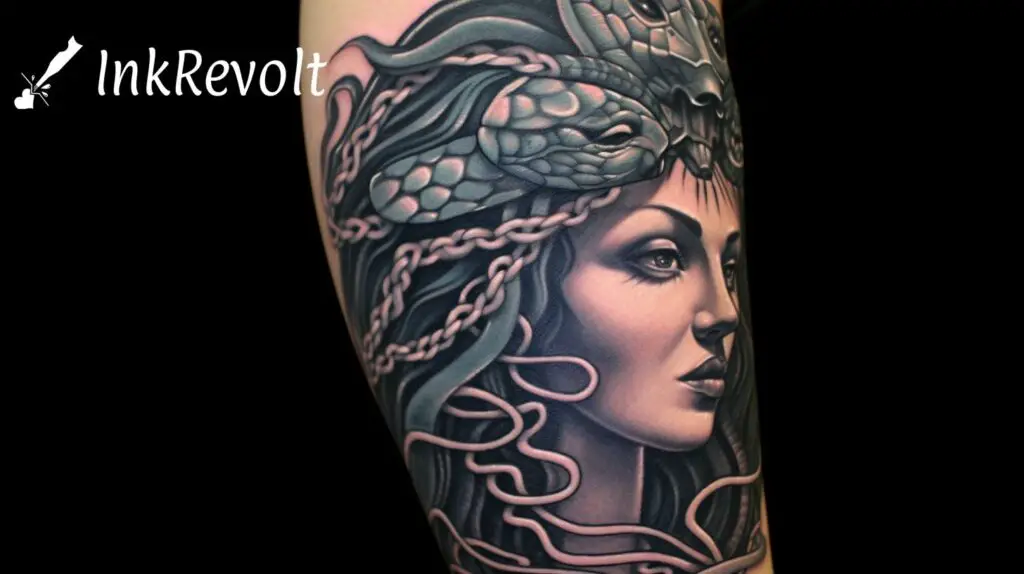What Does a Medusa Tattoo Mean?
In the vast tapestry of human history, few figures conjure as compelling and complex imagery as Medusa—the feared gorgon of Greek mythology, whose gaze could turn beholders to stone. Once a symbol of terror, Medusa’s image has undergone a remarkable transformation over centuries, embodying now diverse meanings like protection, transformation, female empowerment, and overcoming personal challenges.
With this comprehensive deep dive into the realm of Medusa tattoos, we strive to shed light on its multifaceted symbolism, the roots of its potency in the lore of Greek mythology, its variations in design and style, and its personal resonance for those who choose to wear it on their skin. These tattoos, far from being just ornamental, represented personal narratives and beliefs, marking the wearer’s life journey, transformation, or struggles.
Medusa tattoos, thus, serve as a unique intersection of ancient mythology and modern interpretation, etched in skin as enduring symbols. In this article, we’re going to explore the myriad facets of Medusa tattoos—their historical context, styles and designs, and the profound symbolism they carry. We’ll also touch upon their popularity among celebrities and provide a thoughtful guide for those considering a Medusa tattoo.

Historical and Mythological Context of Medusa
Unraveling the essence of Medusa in tattoos compels us to journey back in time, to the age of gods and monsters in ancient Greek mythology. This narrative segment plays a pivotal role in sculpting the connotations and interpretations of the Medusa tattoo, a symbol born out of epic tales, divine punishments, heroic quests, and profound symbolism.
Greek Mythology: The Story of Medusa
To grasp the full scope of the Medusa tattoo, it’s crucial to comprehend the tale of Medusa—a character draped in tragedy, strength, and an unsettling power. As we delve into the narrative, we’ll dissect her origins, the transformation that branded her a monster, and her eventual demise at the hands of the hero Perseus.
Medusa’s Origins
Our tale begins with Medusa’s birth into the ancient world of Greek mythology. Conceived by the primordial sea gods Phorcys and Ceto, she was one of the three Gorgon sisters, alongside Stheno and Euryale.
Despite her eventual monstrous portrayal, early accounts painted Medusa as the mortal one amongst the three, boasting an unparalleled beauty that attracted many suitors. She served as a priestess in the temple of Athena, where her striking features, particularly her magnificent hair, were celebrated.
However, this captivating beauty would soon become the source of her undoing, leading to her transformation into one of Greek mythology’s most horrifying creatures.

The Curse and Transformation of Medusa
Medusa’s life took a sinister turn following an encounter with Poseidon, the god of the sea. He, smitten by her beauty, pursued her. Their union, however, violated the sanctity of Athena’s temple.
Enraged by this transgression, Athena transformed Medusa into a monstrous form. She was given snakes for hair and a visage so horrifying that a mere glance at her would turn the onlooker into stone. This curse was a demonstration of divine retribution—a theme that resonates profoundly in many interpretations of the Medusa tattoo.
Perseus and the Death of Medusa
The final chapter of Medusa’s story features the Greek hero Perseus. Tasked with bringing the head of Medusa as a wedding gift, Perseus embarked on his quest. Using gifts from various gods and a plan from Athena, he managed to behead Medusa without meeting her gaze.
The decapitation of Medusa, as gruesome as it sounds, resonates with the themes of overcoming fear and facing daunting challenges—symbolic layers often represented in the Medusa tattoo.
As we’ve peeled back the layers of Medusa’s tale, it’s clear that her story carries intricate elements of tragedy, transformation, punishment, and heroic quests. These themes form the backbone of Medusa’s representation in tattoos and inspire a myriad of interpretations based on individual perceptions and cultural context.
In the following sections, we’ll explore how these narrative threads weave into the fabric of Medusa’s portrayal in art, and subsequently, the symbolism of the Medusa tattoo.

Symbolism and Interpretations of Medusa in Greek Mythology
In Greek mythology, Medusa embodies a spectrum of powerful symbolism. Her transformation from a beautiful maiden into a terrifying creature illustrates the theme of duality—beauty and horror intermingling in a single entity. This duality manifests itself in the Medusa tattoo, symbolizing the coexistence of contrasting aspects within an individual.
Medusa also stands as a potent symbol of divine retribution and consequences of defying the divine order—a message often invoked by those carrying the Medusa tattoo as a reminder of karmic justice or divine balance.
As we traverse across various eras and cultures, the symbolism and perception of Medusa continue to evolve, as seen in her representation in Roman mythology and later, in modern literature and popular culture.
Medusa in Roman Mythology
While maintaining the general narrative of Medusa from Greek mythology, the Romans perceived Medusa through their lens of cultural interpretation. To Romans, Medusa was an embodiment of the protective force, her frightening image used as apotropaic symbols to ward off evil. The image of Medusa’s head, known as Gorgoneion, was a common protective emblem, featured on shields, doors, and armors.
In the context of tattoos, this protective attribute of Medusa plays a significant role, with individuals using the Medusa tattoo as a symbolic armor, or as a talisman to guard against adversities and ill intentions.
Medusa in Modern Literature and Popular Culture
Fast forward to contemporary times, and we witness Medusa’s resurgence as a multifaceted symbol. She has been reimagined through the lens of feminist interpretations as a figure representing female rage, independence, and resistance against patriarchal oppression.
Simultaneously, in pop culture, Medusa’s image often represents mystery, allure, and danger—an icon of power that both intimidates and captivates. Such modern interpretations are often reflected in the Medusa tattoo, symbolizing personal defiance, female empowerment, and an embracing of one’s enigmatic allure.
Now that we’ve understood the historical and mythological backdrop of Medusa, we can better appreciate how these narratives and symbolic interpretations translate into the language of tattoos.

Medusa in Art and Its Symbolism
Medusa’s potent symbolism didn’t merely remain confined to ancient texts and oral traditions. Artists across centuries have been drawn to her paradoxical image, her story offering fertile ground for various artistic interpretations. Let’s explore how Medusa’s portrayal in art resonates with the symbolism of Medusa tattoos.
Medusa in Ancient Greek and Roman Art
In ancient art, Medusa’s monstrous form was widely depicted as a means of protection. Known as Gorgoneions, these depictions featured Medusa’s head with glaring eyes, protruding tongue, and a tangle of serpentine hair—a protective emblem against evil forces. This motif was extensively used in architecture, coinage, and armor, asserting the prevalent belief in her protective power.
When translated into the canvas of tattoos, the traditional Gorgoneion style offers an intriguing design choice for those wishing to symbolize a protective force or a shield against adversities in their lives.
Renaissance and Baroque Interpretations of Medusa
The Renaissance and Baroque periods witnessed a shift in Medusa’s portrayal, where artists began focusing on her humanity and tragedy rather than her monstrous aspect. Two iconic works from this period, Caravaggio’s Medusa and Cellini’s Perseus with the Head of Medusa, captured her image with a renewed lens of empathy and heroism, while maintaining the theme of overcoming fear and challenges.
Caravaggio’s Medusa, painted on a ceremonial shield, presented her in the throes of her beheading—an intense display of horror and disbelief. Conversely, Cellini’s bronze sculpture showcased the triumphant Perseus holding the decapitated head of Medusa—a powerful depiction of victory over fear.
These interpretations provide a treasure trove of inspiration for Medusa tattoos, with individuals incorporating elements from these artworks to symbolize personal growth, resilience, and the triumph of courage over fear.
Medusa in Contemporary Art
In contemporary art, Medusa is often reimagined as a symbol of female power and defiance. Artists like Luciano Garbati, with his sculpture “Medusa With The Head of Perseus,” subvert the traditional narrative, offering a fresh perspective that aligns with modern feminist interpretations.
Such modern representations of Medusa resonate strongly with the symbolism of Medusa tattoos today, asserting themes of empowerment, rebellion, and challenging traditional norms.
With the artistic context established, we’re now primed to dive into the world of Medusa tattoos, their designs, and their symbolism.

Medusa Tattoos: Styles and Designs
As we cross the bridge from mythology and art to the realm of tattoos, Medusa’s image transforms into an artistic statement inked on skin—a reflection of personal journeys, beliefs, and values. The design of the Medusa tattoo can vary significantly, with each style adding a unique touch to the underlying symbolism.
Classic Medusa Tattoos
Classic Medusa tattoos often draw inspiration from traditional depictions of Medusa, showcasing her in her monstrous form with snake hair and a petrifying gaze. This design is a compelling choice for those looking to embody the themes of protection, power, and divine retribution in their tattoo.
Realistic Medusa Tattoos
Realistic designs present Medusa in a life-like rendition, capturing intricate details of her face, the serpentine hair, and sometimes, her petrified victims. This design style brings a tangible dimension to Medusa’s symbolism, making it a popular choice among those wishing to reflect a complex personal narrative or transformation.
Abstract and Minimalist Medusa Tattoos
For those drawn to subtlety and symbolic representation, abstract and minimalist Medusa tattoos offer an appealing option. These designs might feature simplified renditions of Medusa’s elements, such as a single snake or her eyes, representing the themes of wisdom, transformation, and protection in a less explicit yet equally impactful manner.

Medusa Tattoos with Snakes
Medusa tattoos featuring prominent snakes tend to emphasize the transformative and protective aspects of her symbolism. The snake, a creature symbolizing rebirth, transformation, and healing across cultures, intensifies these themes in the context of a Medusa tattoo.
Medusa Tattoos with Swords
Incorporating swords in a Medusa tattoo often alludes to her beheading by Perseus. This design variant symbolizes victory over one’s fears, personal battles, and the process of overcoming challenging circumstances.
Medusa Tattoos Combined with Other Greek Mythological Symbols
Pairing Medusa with other symbols from Greek mythology can add layers of complexity and richness to the tattoo’s symbolism. For example, a Medusa tattoo paired with the shield of Athena can represent a combination of wisdom, strategic warfare, and protection.
Having explored the wide-ranging styles and designs of Medusa tattoos, we can now delve into their symbolism and interpretations—a fascinating exploration of how ancient mythology, personal narratives, and cultural perceptions converge in the realm of tattoos.
The Meaning And Symbolism of Medusa Tattoos
A Medusa tattoo serves as a canvas where personal meanings intersect with mythological symbolism. Here’s how the tale of Medusa translates into the inked artistry of tattoos.
Protection and Warding Off Evil
Inheriting from the ancient practice of using Medusa’s image as a protective emblem, Medusa tattoos often symbolize protection against evil forces or negative influences. The petrifying power of Medusa in the tattoo serves as a symbolic shield, warding off adversities or ill-willed intentions.
Transformation and Personal Growth
Given Medusa’s dramatic transformation in her myth, a Medusa tattoo can symbolize significant personal changes or periods of growth. Just as Medusa transformed from a maiden to a feared creature, individuals with this tattoo might have experienced life-altering transformations, the tattoo standing as a testament to their evolved self.
Female Empowerment
In line with modern interpretations of Medusa as a symbol of female power, a Medusa tattoo can signify strength, independence, and defiance against societal norms. It can be a bold declaration of one’s feminist beliefs, or a personal symbol of resilience against oppression.
Overcoming Challenges and Fears
Considering the narrative of Perseus overcoming the fear of Medusa to ultimately defeat her, Medusa tattoos can symbolize victory over personal fears or challenges. It serves as a constant reminder of one’s ability to face daunting tasks and emerge victorious.
Duality of Existence
As Medusa embodies the duality of beauty and horror, a Medusa tattoo can reflect the dual aspects within an individual—the ability to harbor both kindness and wrath, love and hate, or beauty and ugliness. It symbolizes the acceptance of these complexities and the harmony in their coexistence.

Famous Personalities with Medusa Tattoos
The Medusa tattoo, with its intricate design and profound symbolism, has found favor among several celebrities and influential personalities. Their Medusa tattoos reflect their personal narratives, beliefs, and artistic inclinations, contributing to the broadening landscape of Medusa tattoo interpretations.
Celebrities with Medusa Tattoos
- Chris Brown: The American singer, songwriter, and actor has a large tattoo of Medusa on the back of his head. The detailed, black-and-white ink work is a striking display of Medusa in her terrifying glory. This tattoo, surrounded by controversy and intrigue much like the celebrity himself, adds a layer of mystery to Brown’s public image.
- Amber Rose: Known for her unique fashion sense and advocacy for women’s rights, Amber Rose sports a Medusa tattoo on her forearm. In line with modern interpretations of Medusa as a symbol of female empowerment, Rose’s tattoo could be viewed as a manifestation of her feminist beliefs and her fight against gender norms.
Influential Tattoo Artists Specializing in Medusa Tattoos
Medusa tattoos require a skilled hand to bring out their intricate details and symbolism. Here are a couple of artists known for their exceptional Medusa designs:
- Nikko Hurtado: An internationally recognized tattoo artist, Hurtado is known for his lifelike portraits and vibrant use of color. His rendition of Medusa tattoos, characterized by detailed realism and stunning contrasts, captures the essence of Medusa’s tragic and terrifying beauty.
- David Vega: A specialist in fine line and realism tattoos, Vega brings a unique subtlety to his Medusa tattoo designs. His work, characterized by intricate details and a soft, grayscale palette, exudes an air of mystery and elegance befitting the Medusa symbolism.
Choosing a Medusa Tattoo: Things to Consider
If you’re considering a Medusa tattoo, it’s essential to deliberate on several factors to ensure your tattoo resonates with your personal story and aesthetic preferences.
Considering Personal Meaning and Connection
Reflect on your personal connection with the Medusa story and its symbolism. Do the themes of transformation, protection, female empowerment, or overcoming challenges resonate with your experiences or beliefs? The essence of your Medusa tattoo lies in this personal resonance, transforming the tattoo from mere skin art into a meaningful personal emblem.
Choosing the Right Style and Design
From classic and realistic to abstract and minimalist, Medusa tattoo designs come in a wide range. Explore these styles and decide which aligns with your aesthetic preference. Would you prefer a traditional Gorgoneion design, a lifelike portrayal of Medusa, or an abstract representation? Consider if you want additional elements like snakes or swords, which bring their symbolic undertones to the tattoo.
Location and Size of the Tattoo
The location and size of your Medusa tattoo play a significant role in its visibility and impact. Larger designs with intricate details might suit broader areas like the back, chest, or thigh. Simpler designs or minimalist interpretations could work well on smaller areas like the wrist, ankle, or behind the ear. Choose a location that matches your comfort level, lifestyle, and personal preference.
Finding a Skilled Tattoo Artist
Given the intricacy and symbolic depth of Medusa tattoos, it’s crucial to find a skilled tattoo artist who can bring your vision to life. Research artists who specialize in the style you’ve chosen and review their portfolios. Remember, a tattoo is a lifelong commitment. Hence, investing time and effort in finding the right artist is worth the outcome.
Conclusion
The Medusa tattoo, steeped in rich mythology and diversified interpretations, is more than an artistic design—it’s a personal emblem, a cultural symbol, and a historical narrative etched in ink. Its multifaceted symbolism, ranging from protection and transformation to empowerment and overcoming challenges, makes it a compelling choice for those seeking a tattoo with profound depth.
As we conclude our exploration, remember that the essence of any tattoo lies in its personal resonance. A Medusa tattoo’s true meaning is intricately woven with the wearer’s personal narrative, beliefs, and experiences, making it an intimate, individualistic symbol.
